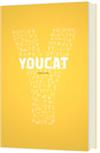15. How can Sacred Scripture be "truth" if not everything in it is right?
Answer: The Bible is not meant to convey precise historical information of scientific findings to us. Moreover, the authors were children of their time. They shared the cultural ideas of the world around them and often were also dominated by its errors. Nevertheless, everything that man must know about God and the way of his salvation is found with infallible certainty in Sacred Scripture. [106-107, 109]
The previous question is:
14. Is Sacred Scripture true?
Answer: The Bible did not fall from heaven in its final form, nor did God dictate it to human scribes who copied it down mechanically. Rather "God chose certain men… who made full use of their own faculties and powers so that, though he acted in them and by them, it was as true authors that they consigned to writing whatever he wanted written, and no more (Second Vatican Council, DV 11). One factor in recognizing particular texts as Sacred Scripture was their general acceptance in the Church. In the Christian communities there had to be a consensus: "Yes, through this text God himself speaks to us – this is inspired by the Holy Spirit!" Which of the many original Christian writings are really inspired by the Holy Spirit has been defined since the fourth century in the so-called Canon of Sacred Scriptures.
Now, Question 14 simply doesn't answer the question; "Is Sacred Scripture True?" – but Question 15, in setting up the premise "…not everything in it is right?" answers that "the authors were children of their time. They shared the cultural ideas of the world around them and often were also dominated by its errors." This simply seems incompatible with the teaching that A) God is the Author of Scripture (thus couldn't be dominated by "errors" and B) the Catholic teaching the Scripture is inerrant. A Catholics United for the Faith (CUF) Faith Fact describes this teaching well.
YouCat's answer seems to take advantage of the ambiguous language in Vatican II's Dogmatic Constitution on Divine Revelation - Dei Verbum (DV) to espouse the false idea of limited inerrancy – the idea that the Bible is without error in certain matters, such as faith, morals and the criteria for salvation; but does contain errors when describing other matters, such as scientific observations, historical events, and the actual authorship of books of the bible. Of course, once the idea that the Bible contains errors is accepted, it is a slippery slope to a practical relativism regarding the Bible and God Who is its true Author.
This is quite troubling in such a generally highly-regarded and highly-endorsed catechism, and I want to be sure that what seems to a problem is a real problem, thus I am consulting those with greater wisdom. If you have a copy of YouCat hanging around, please tell me if somehow, in the context of the whole document these questions are decisively corrected elsewhere – but it would seem troubling that the straightforward text would even raise these questions!
Thanks and God Bless, Ron
For more details on a petition to have YouCat recalled and/or corrected see YouCat Recall

Great info! I recently came across your blog and have been reading along. I thought I would leave my first comment. I don’t know what to say except that I have.
ReplyDeletetext god fabian de rossi pdf